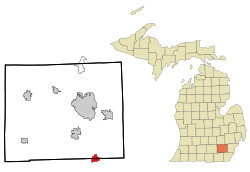Milan, Michigan
| Milan, Michigan | |
|---|---|
| City | |
 Location of Milan, Michigan |
|
| Coordinates: 42°5′9″N 83°41′4″W / 42.08583°N 83.68444°W | |
| Country | United States |
| State | Michigan |
| Counties | Monroe, Washtenaw |
| City Of Milan | 1968 |
| Government | |
| • Type | Mayor/Council |
| • Mayor | Michael Armitage |
| • Mayor Pro-Tem | Martha Churchill |
| Area | |
| • Total | 3.40 sq mi (8.81 km2) |
| • Land | 3.32 sq mi (8.60 km2) |
| • Water | 0.08 sq mi (0.21 km2) |
| Elevation | 702 ft (214 m) |
| Population (2010) | |
| • Total | 5,836 |
| • Estimate (2012) | 5,867 |
| • Density | 1,757.8/sq mi (678.7/km2) |
| Time zone | Eastern (EST) (UTC-5) |
| • Summer (DST) | EDT (UTC-4) |
| ZIP code | 48160 |
| Area code(s) | 734 |
| FIPS code | 26-53920 |
| GNIS feature ID | 0632302 |
| Website | milanmich |
Milan is a city in Monroe and Washtenaw counties in the U.S. state of Michigan. The population was 5,836 at the 2010 census. About 60% of the city's area and 75% of its residents are located on the Washtenaw County side adjacent to York Charter Township in Washtenaw County; while 40% percent of the city's area and 25% of its residents are located on the Monroe County side adjacent to Milan Township.
The city was founded in 1831 by John Marvin, Bethuel Hack, and Harmon Allen. Hack was the first postmaster, and he named the community "Farmer" since everyone there was a farmer. Drug store owner Henry Tolan took over as postmaster and renamed the community "Tolanville" after himself. Next, David Woodard became the post master, with the post office in his flour mill. He renamed the community "Woodard's Mills." The postmaster in Washington D.C. noticed the confusion caused by this swift change in names and decreed that it would henceforth be called "Milan" after the neighboring Milan Township. French settlers in the area named the township "Milan" because they once hoped to produce grapes and wine in the area, so the Italian city by that name seemed appropriate, given Italy's reputation for wine-making. The river going through Milan and Milan township is the Saline River, part of the River Raisin watershed. "River Raisin" refers to Raisin, the French word for grape. Small wild grapes were growing on the banks of the river, so early French settlers in the Monroe area hoped that this area would be wine country. Just southeast of Milan, along Plank road, is an old community by the name of "Grape" which is a reflection of this desire to create a wine producing area. Milan became a village in 1885. It continued as a village until 1967, when it was incorporated as a city.
Walter F. Stimpson was a Milan farm boy who eventually held 74 US patents during his life, and was one of the founders of IBM—International Business Machines.
Stimpson was born in 1870 on a farm west of Mooreville. In 1892 he got his first patent, a mechanism to lower the wheels of a grain harvester. At that time he was a graduate of Cleary Business School and he was teaching school. That same year, he noticed a local grocer frustrated by the scales which were so complicated in figuring out the price of the product. Stimpson spent some time with the blacksmith tools at his father's farm, and tinkered on an old scale. He came up with a revolutionary idea for a "computing scale." Stimpson's ideas to improve scales made a tremendous impact on industry in the US and worldwide because business depends on accurately knowing how much is being bought or sold. He developed scales for large items such as farm scales, such as a wagon full of pumpkins, a cow, or a load of coal. He built a Stimpson factory in Milan on Plank Road at Dexter Road, later the Ideal Foundry. He worked on scales to weigh small items such as envelopes, for postage; candy; or diamonds. In about 1903, Stimpson built a fantastic and imposing brick hotel in downtown Milan, the Stimpson Hotel. The Italianate-style building was later known in Milan as the Danube Inn. It is no longer standing, having been destroyed by fire in 2011. Stimpson set up factories early in his career in Tecumseh, MI; Northville, MI; Detroit; and Elkhart, IN. He settled finally in Louisville, KY. One of Stimpson's Detroit companies eventually merged with a company involved with clocks and a company dealing in cash registers, called the Computing-Tabulating-Recording Company. That company later changed its name to International Business Machines or IBM. In later years, customers of Stimpson Scales, if they needed parts for their scales, contacted IBM as the successor corporation. Stimpson was living in Louisville in 1941 when he died. He left behind a widow and a large, modern factory making coffee grinders, meat slicers, and of course scales.
...
Wikipedia
